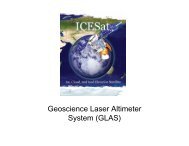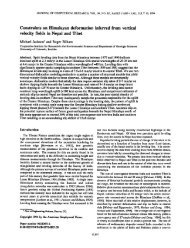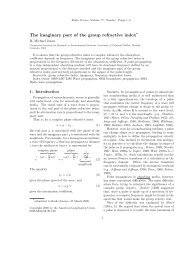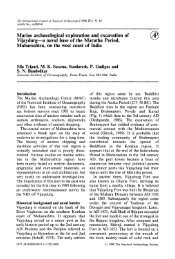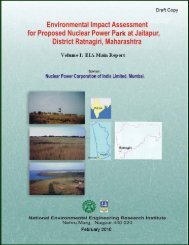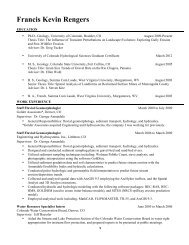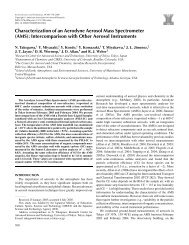2011 - Cooperative Institute for Research in Environmental Sciences ...
2011 - Cooperative Institute for Research in Environmental Sciences ...
2011 - Cooperative Institute for Research in Environmental Sciences ...
Create successful ePaper yourself
Turn your PDF publications into a flip-book with our unique Google optimized e-Paper software.
Maxwell Boykoff<br />
Mak<strong>in</strong>g Sense of Media Representations<br />
of Climate Change<br />
Media representations—from<br />
news to<br />
enterta<strong>in</strong>ment—provide<br />
critical l<strong>in</strong>ks between the<br />
everyday realities of how<br />
people experience climate<br />
change and the ways <strong>in</strong><br />
which these are discussed<br />
between science and policy<br />
actors. Clearly, activities<br />
<strong>in</strong> climate science and<br />
politics have provided<br />
content and characters <strong>for</strong><br />
the media to cover. But<br />
perhaps more subtly, media<br />
representations have,<br />
<strong>in</strong> turn, shaped ongo<strong>in</strong>g<br />
scientific and political<br />
considerations, decisions<br />
and activities. In<br />
other words, mass media have <strong>in</strong>fluenced how issues are<br />
taken <strong>in</strong>to account, who has a say and how. This research<br />
has analyzed how a burgeon<strong>in</strong>g array of ‘actors,’ ‘agents<br />
of def<strong>in</strong>ition’ and ‘claims makers’ <strong>in</strong> these spaces have<br />
created, contested, negotiated and reconfigured climate<br />
science and policy discourses and actions over time.<br />
Many dynamic, nonl<strong>in</strong>ear and complex factors contribute<br />
to how media outlets portray various facets of climate<br />
change. Swirl<strong>in</strong>g contextual factors as well as compet<strong>in</strong>g<br />
journalistic pressures and norms contribute to how issues,<br />
events and <strong>in</strong><strong>for</strong>mation have often become climate ‘news.’<br />
Such challenges have contributed to critical misperceptions,<br />
mislead<strong>in</strong>g debates and divergent understand<strong>in</strong>gs<br />
that are detrimental to ef<strong>for</strong>ts that seek to enlarge rather<br />
than constrict the spectrum of possibility <strong>for</strong> responses to<br />
climate challenges.<br />
This research is situated <strong>in</strong> wider ‘cultural politics of<br />
climate change,’ where <strong>for</strong>mal climate science and governance<br />
l<strong>in</strong>k with daily activities <strong>in</strong> the public sphere. It is<br />
important to exam<strong>in</strong>e ‘how’ media representations have<br />
been negotiated over time and space, through relations of<br />
power and <strong>in</strong>equalities of access and resources, thereby<br />
<strong>in</strong>fluenc<strong>in</strong>g climate action.<br />
World newspaper coverage of climate change, as well<br />
as U.S., United K<strong>in</strong>gdom and India country-level monitor<strong>in</strong>g<br />
of climate coverage, are updated each month here:<br />
http://sciencepolicy.colorado.edu/media_coverage/.<br />
CIRES Annual Report <strong>2011</strong> 27




